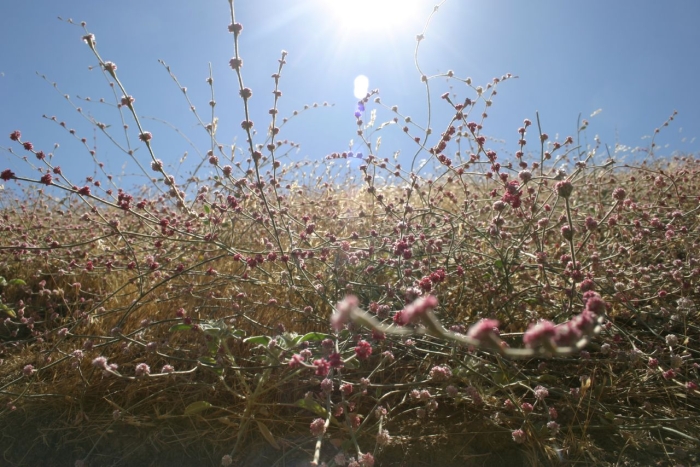Wand Buckwheat
(Eriogonum roseum)
Wand Buckwheat (Eriogonum roseum)
/
/

joedecruyenaere
CC BY-SA 2.0
Image By:
joedecruyenaere
Recorded By:
Copyright:
CC BY-SA 2.0
Copyright Notice:
Photo by: joedecruyenaere | License Type: CC BY-SA 2.0 | License URL: https://creativecommons.org/licenses/by-sa/2.0 | Uploader: Stickpen | Publisher: Wikimedia Commons | Title: Eriogonumroseum.jpg | Notes: {{Information |Description ={{la|1=''[[Eryngium giganteum]]'' }} {{fr|1=[[:fr:Panicaut géant|Panicaut géant]]}} |Source ={{own}} |Author =[[User:Jean-Pol GRANDMONT|Jean-Pol GRANDMONT]] |Date =2010-06-09 15:24 |Permission ... |



























Estimated Native Range
Summary
Eriogonum roseum, commonly known as Wand Buckwheat, is an erect annual herb that is part of the buckwheat family. It is native to the chaparral and coastal sage scrub of California, often found on dry, rocky slopes and in open areas within these ecosystems. Wand Buckwheat typically reaches heights of over half a meter (2 feet) and is characterized by its basal rosette of small oval leaves. The inflorescence is slender with few erect branches, and flower clusters are evenly spaced along the wandlike branches. The flowers bloom in white or shades of yellow and pink, often with both colors present, adding to its ornamental value. Flowering occurs from late spring to early fall, and while not overly showy, they provide a delicate texture to garden settings.
Wand Buckwheat is valued for its drought tolerance and ability to thrive in full sun to part shade with minimal water once established, making it an excellent choice for xeriscaping and native plant gardens. It is also used for habitat restoration projects due to its adaptability to poor, fast-draining soils. Gardeners appreciate its low maintenance and the subtle beauty it adds to rock gardens and dry borders. However, it is not commonly used in urban plantings due to its preference for natural, undisturbed settings. Potential problems include overwatering, which can lead to root rot. It is also not tolerant of heavy, clay soils. There are no significant diseases or pests that commonly affect this plant.CC BY-SA 4.0
Wand Buckwheat is valued for its drought tolerance and ability to thrive in full sun to part shade with minimal water once established, making it an excellent choice for xeriscaping and native plant gardens. It is also used for habitat restoration projects due to its adaptability to poor, fast-draining soils. Gardeners appreciate its low maintenance and the subtle beauty it adds to rock gardens and dry borders. However, it is not commonly used in urban plantings due to its preference for natural, undisturbed settings. Potential problems include overwatering, which can lead to root rot. It is also not tolerant of heavy, clay soils. There are no significant diseases or pests that commonly affect this plant.CC BY-SA 4.0
Plant Description
- Plant Type: Herb, Subshrub
- Height: 3-6 feet
- Width: 0.3-1 feet
- Growth Rate: Moderate
- Flower Color: Cream, Pink, White, Yellow
- Flowering Season: Fall, Summer
- Leaf Retention: Deciduous
Growth Requirements
- Sun: Full Sun, Part Shade
- Water: Low
- Drainage: Fast
Common Uses
Bee Garden, Bird Garden, Butterfly Garden, Drought Tolerant, Low Maintenance
Natural Habitat
Native to chaparral and coastal sage scrub of California
Other Names
Common Names: Longstem Buckwheat, Wand Wild Buckwheat
Scientific Names: , Eriogonum roseum, Eriogonum virgatum, Eriogonum vimineum subsp. virgatum, Eriogonum verticillatum, Eriogonum virgatum var. roseum, Eriogonum virgatum var. rubidum,
GBIF Accepted Name: Eriogonum roseum Durand & Hilg.